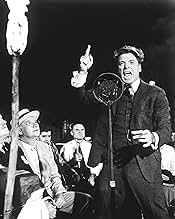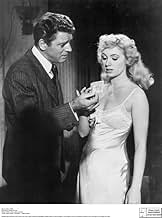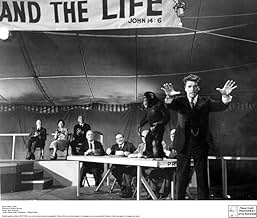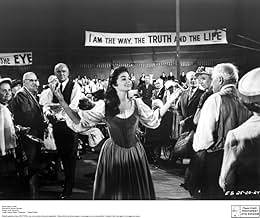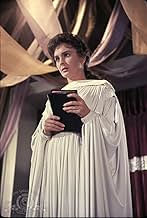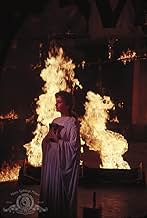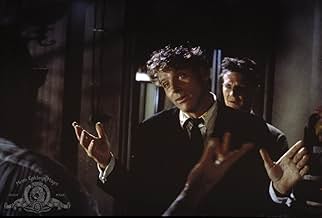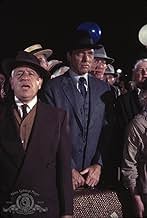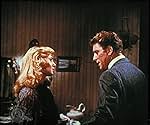NOTE IMDb
7,7/10
14 k
MA NOTE
Un vendeur bavard et charmant arrive à convaincre une évangéliste sincère qu'il pourrait être un prédicateur efficace pour sa cause.Un vendeur bavard et charmant arrive à convaincre une évangéliste sincère qu'il pourrait être un prédicateur efficace pour sa cause.Un vendeur bavard et charmant arrive à convaincre une évangéliste sincère qu'il pourrait être un prédicateur efficace pour sa cause.
- Réalisation
- Scénario
- Casting principal
- Récompensé par 3 Oscars
- 11 victoires et 14 nominations au total
Edward Andrews
- George F. Babbitt
- (as Ed Andrews)
Harry Antrim
- Salesman in Saloon
- (non crédité)
Larry J. Blake
- Mac - Bartender
- (non crédité)
Phil Bloom
- Cornerman
- (non crédité)
Paul Bradley
- Congregation Member
- (non crédité)
Avis à la une
I give this movie a 10 only because there is nothing above that.
I first saw this movie as a kid on TV not that long after it came out. It hasn't aged one bit. That it came out the same year as Inherit the Wind, another masterpiece, is interesting but not surprising. Hollywood was turning the spotlight on the dangers of religious fundamentalism that have since become far more powerful in this country.
Everything about this movie is first rate. Lancaster's acting isn't acting; it is better than that. He simply becomes Gantry, and you believe in him - as he believes in himself, from time to time - completely. The script is powerful, the directing first rate.
This is one of those movies that I sit down and watch when it shows up on TV, no matter how many times I have seen it before. It really is one remarkable movie.
I first saw this movie as a kid on TV not that long after it came out. It hasn't aged one bit. That it came out the same year as Inherit the Wind, another masterpiece, is interesting but not surprising. Hollywood was turning the spotlight on the dangers of religious fundamentalism that have since become far more powerful in this country.
Everything about this movie is first rate. Lancaster's acting isn't acting; it is better than that. He simply becomes Gantry, and you believe in him - as he believes in himself, from time to time - completely. The script is powerful, the directing first rate.
This is one of those movies that I sit down and watch when it shows up on TV, no matter how many times I have seen it before. It really is one remarkable movie.
For some reason Richard Brooks seemed to think of himself as the man best suited to turning great novels and plays into films, but if the results were at best entertaining ("The Brothers Karamazov", "Cat on a hot tin roof") they tended to fall far short of the originals. If "Elmer Gantry" worked better than most was largely due to Brooks ability to tell a rattling good yarn at a cracking pace and to the performances of a superb cast.
Burt Lancaster seemed born to play the role of the lustful traveling salesman whose desire for the Aimee Semple McPhearson-like Sister Sharon turns him into a charismatic preacher, (his performance here is a virtual reprise of his performance as Starbuck in "The Rainmaker" a few years earlier). As Sharon, Jean Simmons gives a luminous performance, all fragility and repressed sexuality and singer Shirley Jones is a revelation as a trampy prostitute; (both she and Lancaster were rewarded with Oscars). Not great then, but several cuts above what it might have been.
Burt Lancaster seemed born to play the role of the lustful traveling salesman whose desire for the Aimee Semple McPhearson-like Sister Sharon turns him into a charismatic preacher, (his performance here is a virtual reprise of his performance as Starbuck in "The Rainmaker" a few years earlier). As Sharon, Jean Simmons gives a luminous performance, all fragility and repressed sexuality and singer Shirley Jones is a revelation as a trampy prostitute; (both she and Lancaster were rewarded with Oscars). Not great then, but several cuts above what it might have been.
It's the prohibition era. Elmer Gantry (Burt Lancaster) is a slick traveling salesman who is a boozer and a dog hound. He is a born salesman well versed with the bible. He is so good that it is hard to tell the difference whether he's sincere or lying. He is one haunted by his checkered past and his immorality. He is taken with Sister Sharon Falconer (Jean Simmons) who runs revival meetings. She's a true believer. He badgers her until she allows him to preach. He becomes so successful that he becomes indispensable to Sister Sharon's roadshow. Bill Morgan sees thru Elmer and tells Sharon that in 1917 he was expelled from the seminary for seducing the deacon's daughter. She ignores the warning and they become a great success in the big city. Then his past comes back to haunt him in the form of Lulu Bains (Shirley Jones) who is now a prostitute.
Burt Lancaster gives such a big performance. It is so big that it always has a tinge of falsehood. His laugh is so outrageous that it plays both sides of the divide. It's this big performance that is so memorable. Jean Simmons is the perfect compliment. She is the embodiment of purity of spirit. Burt definitely deserves his Oscar win. I can see some people taking offense from the depiction of religious revival. However I see a great role model in Sister Sharon. It's also a tale of salvation for Elmer Gantry.
Burt Lancaster gives such a big performance. It is so big that it always has a tinge of falsehood. His laugh is so outrageous that it plays both sides of the divide. It's this big performance that is so memorable. Jean Simmons is the perfect compliment. She is the embodiment of purity of spirit. Burt definitely deserves his Oscar win. I can see some people taking offense from the depiction of religious revival. However I see a great role model in Sister Sharon. It's also a tale of salvation for Elmer Gantry.
Elmer Gantry the novel came out in 1925 and it took 35 years to get it to the screen. But it certainly was worth the wait. The movie provided Burt Lancaster, Shirley Jones, and Richard Brooks all with Oscars and it has become a classic. But we sure view it differently 80 years after the book and 55 years after the movie debuted.
Inherit the Wind and Elmer Gantry came out in the same year and both were set in the Twenties. Both dealt with fundamentalist religion and the power it held. Both films got Oscar nominated for best film and for Best Actor for it's first billed male player.
In 1960 when you saw both films they were viewed as tales of a bygone era. Evangelists like Elmer Gantry and Sister Sharon Falconer have the kind of power that thankfully we don't give the fundamentalist community now. Even seeing film clips of Billy Sunday and Aimee Semple McPherson, they seemed quaint and old fashioned. Fortunately we'd outgrown the nonsense of that era.
But Sinclair Lewis proved to be a prophet. No one could ever have dreamed in 1960 that fundamentalist Christians would have the political power they do today. What Lewis if he were alive today would do with Pat Robertson, Jerry Falwell, John Hagee and the rest of that crowd would really be something. Elmer Gantry is alive and well. Some might even call it a resurrection.
And Elmer's a part that comes once in a lifetime to a player. Liar, conman, womanizer and likable on top. You've got to be a real extrovert to play that part. So Richard Brooks got perhaps one of the biggest extroverts ever to hit Hollywood.
Burt Lancaster was born to play Gantry, in fact he'd had something of a dress rehearsal in the part in The Rainmaker. During those sermon scenes, some of which are taken from Billy Sunday's actual sermons, you know he's giving out with nonsense and you still get taken in by his charm. Note the relationship between Lancaster and agnostic reporter Arthur Kennedy. Kennedy knows he's a conman, but still they get along just great.
It was a shame that Jean Simmons was neglected by the Academy for her portrayal of Sharon Falconer. Sharon is a true believer, but she's also a romantic as the real Aimee Semple McPherson was. And the woman had needs which Elmer is only too glad to fulfill.
The real Aimee was also an outrageous character herself, but I believe a decent soul at heart. During the Depression, her tabernacle set up a soup kitchen that fed thousands. In fact Anthony Quinn, growing up in Los Angeles at the time, recalled in his memoirs working for his and his family's supper as a volunteer there. Quinn had nothing but praise for Aimee, she was the difference in whether his family ate or not on many a day.
Shirley Jones got a career salvation with her Oscar winning role as Lulu Baines, prostitute who's out for vengeance. A fine singer, she came along unfortunately when musicals were winding down. That Oscar for Best Supporting Actress insured a continuing career for her.
Arthur Kennedy as the investigative reporter is whose perspective we view the film from. He'd had five trips to the Oscar World Series without a victory, might have been nice if this one had been a sixth. His is the voice of reason, of true compassion, of truth in fact the voice of Sinclair Lewis himself.
Another of Sinclair Lewis's great characters, George F. Babbitt, makes an appearance. Edward Andrews got probably his career part as Babbitt, hypocritical businessman to the max. He was as born to play Babbitt as Lancaster was to play Gantry. He could also have been given an Oscar nomination.
Elmer Gantry is a great film, a prophetic film, proving it sure can happen here.
Inherit the Wind and Elmer Gantry came out in the same year and both were set in the Twenties. Both dealt with fundamentalist religion and the power it held. Both films got Oscar nominated for best film and for Best Actor for it's first billed male player.
In 1960 when you saw both films they were viewed as tales of a bygone era. Evangelists like Elmer Gantry and Sister Sharon Falconer have the kind of power that thankfully we don't give the fundamentalist community now. Even seeing film clips of Billy Sunday and Aimee Semple McPherson, they seemed quaint and old fashioned. Fortunately we'd outgrown the nonsense of that era.
But Sinclair Lewis proved to be a prophet. No one could ever have dreamed in 1960 that fundamentalist Christians would have the political power they do today. What Lewis if he were alive today would do with Pat Robertson, Jerry Falwell, John Hagee and the rest of that crowd would really be something. Elmer Gantry is alive and well. Some might even call it a resurrection.
And Elmer's a part that comes once in a lifetime to a player. Liar, conman, womanizer and likable on top. You've got to be a real extrovert to play that part. So Richard Brooks got perhaps one of the biggest extroverts ever to hit Hollywood.
Burt Lancaster was born to play Gantry, in fact he'd had something of a dress rehearsal in the part in The Rainmaker. During those sermon scenes, some of which are taken from Billy Sunday's actual sermons, you know he's giving out with nonsense and you still get taken in by his charm. Note the relationship between Lancaster and agnostic reporter Arthur Kennedy. Kennedy knows he's a conman, but still they get along just great.
It was a shame that Jean Simmons was neglected by the Academy for her portrayal of Sharon Falconer. Sharon is a true believer, but she's also a romantic as the real Aimee Semple McPherson was. And the woman had needs which Elmer is only too glad to fulfill.
The real Aimee was also an outrageous character herself, but I believe a decent soul at heart. During the Depression, her tabernacle set up a soup kitchen that fed thousands. In fact Anthony Quinn, growing up in Los Angeles at the time, recalled in his memoirs working for his and his family's supper as a volunteer there. Quinn had nothing but praise for Aimee, she was the difference in whether his family ate or not on many a day.
Shirley Jones got a career salvation with her Oscar winning role as Lulu Baines, prostitute who's out for vengeance. A fine singer, she came along unfortunately when musicals were winding down. That Oscar for Best Supporting Actress insured a continuing career for her.
Arthur Kennedy as the investigative reporter is whose perspective we view the film from. He'd had five trips to the Oscar World Series without a victory, might have been nice if this one had been a sixth. His is the voice of reason, of true compassion, of truth in fact the voice of Sinclair Lewis himself.
Another of Sinclair Lewis's great characters, George F. Babbitt, makes an appearance. Edward Andrews got probably his career part as Babbitt, hypocritical businessman to the max. He was as born to play Babbitt as Lancaster was to play Gantry. He could also have been given an Oscar nomination.
Elmer Gantry is a great film, a prophetic film, proving it sure can happen here.
I just spend two days at my best friends' home for his father's funerals, and during the obligatory moments of life contemplation, we were wondering what was awaiting us all. I guess it's hard to imagine that your beloved one has faded into nothingness, so religion brings you a certain psychological comfort in knowing that there's such a thing as a soul and that, depending on a man's life, it gets the treatment it deserves. Yes, sir-ree, it might feel simplistic but at least it's fair and square.
I think this logic might explain why revivalism is so fervent in America, most of the small-town folks wouldn't fancy an alternative to an after-world where the good isn't rewarded and the evil punished, God fabricated men in its own image so it's only fair that men built a society that works in the same way than God, even if God can act in mysterious ways... let's face it, even the most sophisticated ones of us wouldn't figure out a universe where religion, as complex as it is, wouldn't be easy to "pitch", no matter how tempting agnosticism could be.
This is why promoting revivalism in the hearts of Americans isn't the most difficult thing to operate, it all comes down to telling people that they're going to burn in hell if they sin and to save their souls if they repent, people are ready to hear that if the words come from the right mouths, it's like a good cop/bad cop routine. In Richard Brooks' "Elmer Gantry", adapted from the novel of the same name by Sinclair Lewis, the good cop is Jean Simmons as Sister Sharon Falconer, a saintly revivalist who talks in sweet and delicate prose, and handles her followers and her endeavor like a businessman would do, and there's the bad cop, but one hell of a smooth-talker named Elmer Gantry.
In the original novel, he was an ordained Minister, in the film, in order to appease the Hays Code, he's an ex-Bible salesman who learned the voices of Gospel from scratch and is capable to infuse Bible passages in every monologue, with a grin that would convince the devil himself to sing Halleluiah. To call Gantry charismatic is an understatement, the casting of Burt Lancaster is perfect if only for providing him that irresistible smile, one so charming that it can get away with the scariest threats or allow an improvised line about love to become his catchphrase and play like a running gag all through the film.
What works even better in Lancaster's performance is that his intents are rarely clear and a big cloud of mystery floats around his solid shoulders. His character-establishing moment occurs when he convinces a bunch of drunkards to give charity money to old Christian ladies during a Xmas celebration. With his smile, he manages to skim money off a few piles without even asking, working like the gangster who'd get anything with a smile rather than a threat. Before, he was telling naughty jokes and after, he would have sex with Lulu Baines (Shirley Jones), a hooker who couldn't resist his words, a move that would backfire at him later. Gantry is irresistible indeed, but he's a swindler and I'd say about him what I say about Fellini's "Bidone", before you find them sympathetic, keep in mind it's part of their job.
So Gantry drifts from a place to another until he meets Sister Shara and has an epiphany. He cons her into believing he can attract the crowds with a "saved salesman" speech, Gantry brings crowds indeed and makes arrangements with Zenith church leaders, convincing her that religion must be a spectacle and must bring money in order to survive, and then we get to a second act where it's all about the spectacular improvisation of Lancaster and the professional talent of Simmons, religion turns out to be a big circus, where even the enthusiasm of the audience is part of the show. Lancaster and Jones won the Oscar but Jean Simmons was sure robbed of a nomination and even Arthur Kennedy as the no-nonense big-city reporter Lefferts had a few interesting sequences as the man of reason in the midst of that huge cacophony.
Yes, because there's a lot of noise in the film and this is why it never ceases to be entertaining, so many speeches like a "Network" of the 60s, the noise of religious frenzy, of media craving for sensationalism, of cheering and booing, of "Glory Glory Halleluiah", the film was directed the same year than "Inherit the Wind" but the handling of religion and religious figures is in such a hyperbolic way we might suffer from dizziness, especially when romantic feelings get mixed up and the film culminates with a third act where the ugliness implodes on everyone, what goes around...
This all leads to the inevitable confrontation between good ol' truth and ol' time religion... but the film (like "Inherit the Wind") tries to give the two sides a fair trial, even avoiding to make a total scam out of Gantry and keep him sympathetic even when he's truly guilty of manipulation. But isn't it all about manipulation after all? Media, businessmen, corporations, public opinion, religion, are all institutions guided by noble intentions but that couldn't keep on going without money. Some things exist because they have to... and because they need to exist must count on the shadiest ambassadors, ironically, Gantry was the most human of all, especially with his weakness for a good drink.
The film explores all the facets and allows each side to be given a fair treatment but it also shines by its punchy script, gutsy approach and an unforgettable performance by Burt Lancaster aka "The Grin", a hard-drinking fellow who embodied an aspect of religion that can echo Homer's statement about alcohol as the cause and the solution to all men's problem. Cheers!
I think this logic might explain why revivalism is so fervent in America, most of the small-town folks wouldn't fancy an alternative to an after-world where the good isn't rewarded and the evil punished, God fabricated men in its own image so it's only fair that men built a society that works in the same way than God, even if God can act in mysterious ways... let's face it, even the most sophisticated ones of us wouldn't figure out a universe where religion, as complex as it is, wouldn't be easy to "pitch", no matter how tempting agnosticism could be.
This is why promoting revivalism in the hearts of Americans isn't the most difficult thing to operate, it all comes down to telling people that they're going to burn in hell if they sin and to save their souls if they repent, people are ready to hear that if the words come from the right mouths, it's like a good cop/bad cop routine. In Richard Brooks' "Elmer Gantry", adapted from the novel of the same name by Sinclair Lewis, the good cop is Jean Simmons as Sister Sharon Falconer, a saintly revivalist who talks in sweet and delicate prose, and handles her followers and her endeavor like a businessman would do, and there's the bad cop, but one hell of a smooth-talker named Elmer Gantry.
In the original novel, he was an ordained Minister, in the film, in order to appease the Hays Code, he's an ex-Bible salesman who learned the voices of Gospel from scratch and is capable to infuse Bible passages in every monologue, with a grin that would convince the devil himself to sing Halleluiah. To call Gantry charismatic is an understatement, the casting of Burt Lancaster is perfect if only for providing him that irresistible smile, one so charming that it can get away with the scariest threats or allow an improvised line about love to become his catchphrase and play like a running gag all through the film.
What works even better in Lancaster's performance is that his intents are rarely clear and a big cloud of mystery floats around his solid shoulders. His character-establishing moment occurs when he convinces a bunch of drunkards to give charity money to old Christian ladies during a Xmas celebration. With his smile, he manages to skim money off a few piles without even asking, working like the gangster who'd get anything with a smile rather than a threat. Before, he was telling naughty jokes and after, he would have sex with Lulu Baines (Shirley Jones), a hooker who couldn't resist his words, a move that would backfire at him later. Gantry is irresistible indeed, but he's a swindler and I'd say about him what I say about Fellini's "Bidone", before you find them sympathetic, keep in mind it's part of their job.
So Gantry drifts from a place to another until he meets Sister Shara and has an epiphany. He cons her into believing he can attract the crowds with a "saved salesman" speech, Gantry brings crowds indeed and makes arrangements with Zenith church leaders, convincing her that religion must be a spectacle and must bring money in order to survive, and then we get to a second act where it's all about the spectacular improvisation of Lancaster and the professional talent of Simmons, religion turns out to be a big circus, where even the enthusiasm of the audience is part of the show. Lancaster and Jones won the Oscar but Jean Simmons was sure robbed of a nomination and even Arthur Kennedy as the no-nonense big-city reporter Lefferts had a few interesting sequences as the man of reason in the midst of that huge cacophony.
Yes, because there's a lot of noise in the film and this is why it never ceases to be entertaining, so many speeches like a "Network" of the 60s, the noise of religious frenzy, of media craving for sensationalism, of cheering and booing, of "Glory Glory Halleluiah", the film was directed the same year than "Inherit the Wind" but the handling of religion and religious figures is in such a hyperbolic way we might suffer from dizziness, especially when romantic feelings get mixed up and the film culminates with a third act where the ugliness implodes on everyone, what goes around...
This all leads to the inevitable confrontation between good ol' truth and ol' time religion... but the film (like "Inherit the Wind") tries to give the two sides a fair trial, even avoiding to make a total scam out of Gantry and keep him sympathetic even when he's truly guilty of manipulation. But isn't it all about manipulation after all? Media, businessmen, corporations, public opinion, religion, are all institutions guided by noble intentions but that couldn't keep on going without money. Some things exist because they have to... and because they need to exist must count on the shadiest ambassadors, ironically, Gantry was the most human of all, especially with his weakness for a good drink.
The film explores all the facets and allows each side to be given a fair treatment but it also shines by its punchy script, gutsy approach and an unforgettable performance by Burt Lancaster aka "The Grin", a hard-drinking fellow who embodied an aspect of religion that can echo Homer's statement about alcohol as the cause and the solution to all men's problem. Cheers!
Le saviez-vous
- AnecdotesWhen he first learned that Richard Brooks was interested in adapting his novel, Sinclair Lewis told him that he should change it significantly, advising him to read all the criticisms of the book and use them as a way to improve on it.
- GaffesThe location where Sister Sharon confronts the police captain and fire chief over erecting her tent is purported to be in Lincoln Nebraska. The opening part of the scene shows mountains in the background. There are no mountains around Lincoln.
- Citations
Lulu Bains: Oh, he gave me special instructions back of the pulpit Christmas Eve. He got to howlin' "Repent! Repent!" and I got to moanin' "Save me! Save me!" and the first thing I know he rammed the fear of God into me so fast I never heard my old man's footsteps!
- Crédits fousScrolled before the opening credits: "We believe that certain aspects of Revivalism can bear examination- that the conduct of some revivalists makes a mockery of the traditional beliefs and practices of organized Christianity! We believe that everyone has a right to worship according to his conscience, but- Freedom of Religion is not license to abuse the faith of the people! However, due to the highly controversial nature of this film, we strongly urge you to prevent impressionable children from seeing it!"
- ConnexionsFeatured in Hollywood: The Fabulous Era (1962)
- Bandes originalesI'm On My Way to Canaan Land
(uncredited)
Traditional
Arranged by Mahalia Jackson
Sung by Patti Page and the audience at a revival meeting
Reprised by her at the end
Meilleurs choix
Connectez-vous pour évaluer et suivre la liste de favoris afin de recevoir des recommandations personnalisées
- How long is Elmer Gantry?Alimenté par Alexa
Détails
- Date de sortie
- Pays d’origine
- Langue
- Aussi connu sous le nom de
- Elmer Gantry, ni bendito ni maldito
- Lieux de tournage
- Société de production
- Voir plus de crédits d'entreprise sur IMDbPro
Box-office
- Budget
- 3 000 000 $US (estimé)
- Montant brut mondial
- 64 $US
- Durée2 heures 26 minutes
- Rapport de forme
- 1.66 : 1
Contribuer à cette page
Suggérer une modification ou ajouter du contenu manquant


